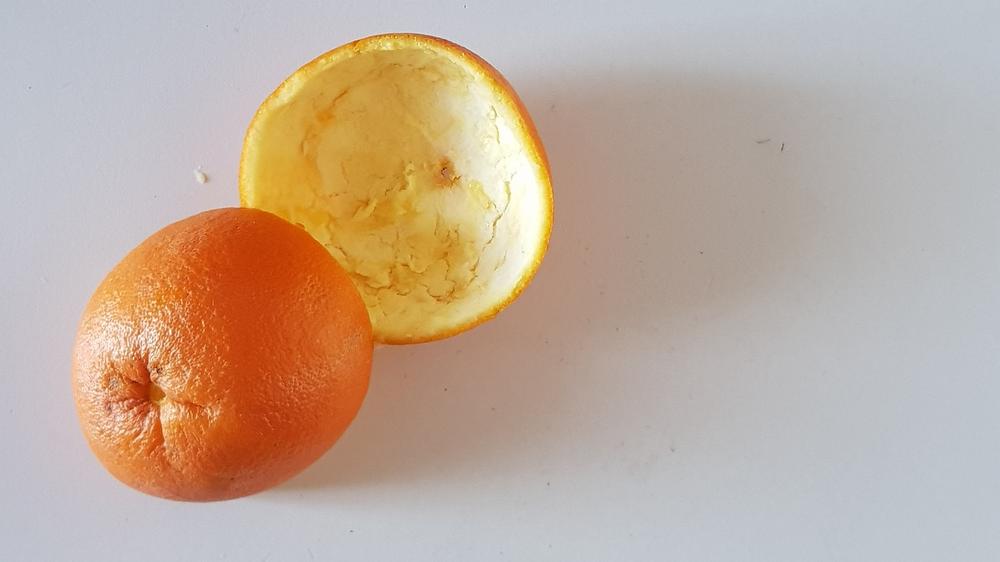Do Orange Peels Keep Cats Away? (Is It Just a Dumb Myth?)

Want to find out if orange peels can really keep cats away?
Are you tired of trying ineffective cat deterrents and feeling a bit hopeless?
Trust me, I've been there.
You're not alone in your search for a natural solution to keep those pesky cats out of your garden or away from your furniture.
But fear not, my friend 😺, because I've got some intriguing information that might just change your life (or at least your cat situation).
So buckle up and get ready for some surprising insights into the magical world of orange peels and feline repellency.
How to Make a Cat Repellent Using Orange Peels?

If you want to keep cats away, you can use orange peels in a few ways.
- Make little bags of orange peel and put them around your garden or where you don't want cats to be. The strong citrus smell will do the trick.
- Boil some orange peels for a bit, let it cool, and then pour it into a spray bottle. You've got yourself a DIY cat repellent spray. Spritz it on surfaces you want cats to stay away from.
- Boil orange peels in water, let it cool, and transfer it to a spray bottle. Now you've got an effective deterrent against cats. The natural oils from the peels will help keep them away.
- Chop up some orange peels into small pieces and scatter them in areas you want to protect. Cats really hate the smell of oranges, so this should help.
Remember that the scent may fade over time, so you might need to reapply the orange peels every now and then.
Main points I'll expand upon further down this article:
- Cats can be repelled by the strong smell of citrus fruits like oranges, lemons, and limes.
- Exercise caution when using citrus fruits as deterrents to prevent accidental ingestion by cats.
- Orange peels contain oils that effectively deter cats and decompose over time, providing nutrients to the soil.
- Cats generally dislike the smell of oranges and other citrus fruits due to their sensitive noses.
- Using orange peels as a cat deterrent is an effective and natural method for keeping cats away in gardens, fences, and indoors.
- Regular replacement of orange peels is necessary as they lose their scent quickly.
- Safety precautions should be taken to prevent ingestion of large quantities of orange peels, as they can be toxic.
- Alternative options for cat repellents include vinegar, coffee grounds, and other herbs, as well as lemon or lime peels.
- Mechanical solutions like motion-sensor sprinklers, motion lights, noisemakers, chicken wire, and spiky objects can also be effective.
- Consider the health risks associated with stray cats and the use of natural deterrents such as lavender, geranium, and pennyroyal.
Exploring Cat Repellent: Plants, Orange Peels, Pros & Cons
Citrus fruits, like oranges, lemons, and limes, have a powerful smell that repels cats.
But be careful when using these fruits as deterrents because you don't want your feline friend accidentally ingesting them. The oils in orange peels are especially effective at keeping cats away. You can even boost the repellent's power by adding scented herbs like lavender or rosemary to the mix. Not only do orange peels keep cats at bay, but they also decompose over time, enriching the soil with nutrients.
Cats have sensitive noses, so the strong scent of citrus fruits usually sends them running.

With this safe and effective method, you can say goodbye to unwanted feline visitors.
In addition, if you're looking for even more ways to keep those pesky felines out of your yard, I highly recommend checking out my article on whether moth balls can effectively deter cats from certain areas.
You may be feeling curious, hopeful, or skeptical about this method, and I understand that.
That's why I've written a comprehensive guide called Do Moth Balls Keep Cats Away to help answer all your questions and provide you with the information you need.
So, if you want to explore this alternative approach further, head over to my blog post and find out if moth balls are the ideal solution for you.
Tips for Using Orange Peels Effectively as a Cat Deterrent
Orange peels work like magic to keep cats away. 😺

The best part?
They're natural and effective!
Here's what you need to do:
- Place orange peels strategically around your garden, fences, and walls - locations where cats hate the smell of citrus fruits. This will keep them out of those areas.
- Replace the orange peels regularly because their scent fades quickly. Every few days should suffice. Don't let them lose their power!
- If there's a specific area inside your home that you want to be cat-free, just put some orange peels there. The smell will make cats scram.
- Be careful though, orange peels can be toxic if ingested in large quantities by our furry friends. Let's keep them safe.
- While orange peels are fantastic, don't limit yourself. There are plenty of other methods to deter cats. Don't waste time searching for specific brands or websites – use your imagination and find what suits you best.
By following these tips, you'll have a space without any pesky cats!
Alternatives to Orange Peels for Making a Cat Repellent
If you're tired of the raggedy felines waltzing across your yard, don't sweat it!
You've got plenty of other options to test out.
Here are seven ways to make a cat repellent without resorting to orange peels:
- Mix up some coffee grounds and water and get spraying.
- Use vinegar as a good old-fashioned deterrent.
- Sprinkle herbs like lavender or rosemary around, cats hate 'em.
- Don't have any oranges? Lemon or lime peels work just as well.
- Want something mechanical? A motion-sensor sprinkler will do the trick.
- Frighten them away with motion lights, they won't know what hit 'em.
- If all else fails, try noisemakers, chicken wire, or spiky objects that will keep those furry trespassers off your turf.
Lastly, if you've got leftover lemons, limes, or grapefruit peels lying around, use 'em in place of orange peels for the same cat-repelling effect.
Give these alternatives a whirl and say goodbye to those pesky pests!
Now, you might be wondering what other natural methods can be used to keep cats out of your yard.
Well, get ready because I have some fascinating tricks up my sleeve that will surely pique your curiosity...
Other Natural Cat Repellents to Consider
Natural repellents made from common household items
Did you know that you can make natural cat repellents at home?
No need to waste money on expensive products. Just sprinkle some cayenne pepper around problem areas.
Cats really don't like the smell or taste of it, so they won't come back for seconds. But wait, there's more!
You can also try using coffee grounds, lemon peels, or even lime peels as natural deterrents.
These scents are not appealing to cats, so they should stay away.
Motion-activated sprinklers for the win
If your garden is a favorite hangout spot for cats, then it's time to bring out the big guns.A motion-activated sprinkler system with a gentle spray can work wonders in keeping those feline intruders away.
And guess what?
There's another trick up our sleeves. Even strong smells like creams, chemicals, and air fresheners can repel cats. So strategically place them around your garden, and not only will it keep the cats away, but your garden will also smell nice.
Scare tactics for unwanted feline visitors
Sometimes, when cats are spotted in the garden, all you need to do is scare them away.
Don't worry, I'm not suggesting anything harmful here. You can use water guns or even make a little noise with a whistle or two.
Cats really dislike surprises, and a bit of commotion is all it takes to send them running.
Just please bear in mind that stray cats can carry toxoplasma gondii, which is a parasite that poses a health risk to humans.
So it's best to take precautions and ensure those cats stay away.
And that wraps up today's article.
If you wish to read more of my useful articles, I recommend you check out some of these: Why Do Cats Like Vaseline, Does Bleach Keep Cats Away, How to Potty Train a Cat Without a Litter Box, Is It Normal for Pet Cats to Chew Corners of Inedible Things, and Do Cats Like Rain
Talk soon,
-Sarah Davis